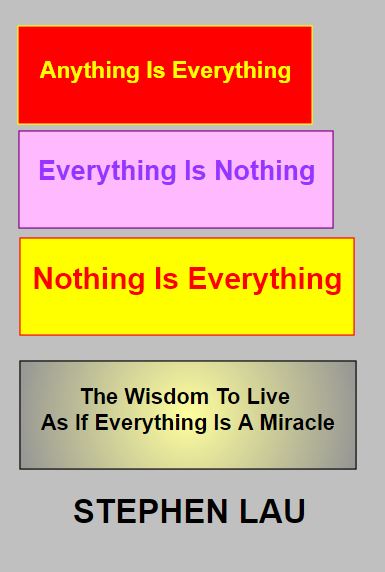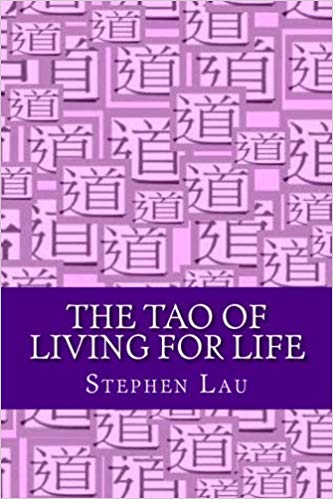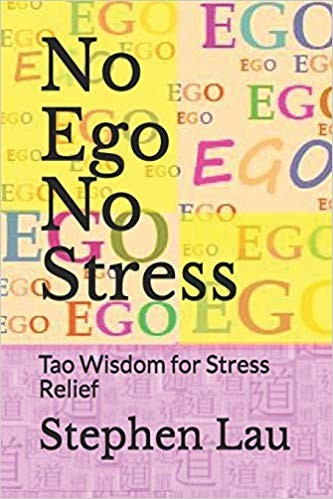
Anything Is Everything
by
Stephen Lau
by
Stephen Lau



What is meant by “anything is everything”? It may have different meanings and different interpretations to different individuals.
First of all, human perceptions are subjective and individualized: they are affected not only by the five senses, but also by the unique experiences of an individual, as well as by the indelible memories of those experiences retained in the mind of that individual. Therefore, what is important to you may not be as important to others, and vice-versa. For this reason, anything could be everything to you, but not to others.
An illustration
Near the end of 2016, a road rage occurred in Arkansas that ended in the tragic death of a 3-year-old child.
A woman, with her 3-year-old grandson sitting at the back of her car, stopped at a stop sign. A man in the car right behind honked her for not starting her car immediately, but the woman honked back; thus the road rage began with the man firing a gun shot at the back of the woman’s car.
Stopping too long at a stop sign, or wanting to get to a place on time might be everything to the man. Having the right to remain where she was might also be everything to the woman, so she naturally honked back.
Unfortunately, that anything-is-everything incident ended in tragedy-the death of the woman’s three-year-old grandson being shot dead while sitting at the back of her car.
In real life, anything could be everything to real people-it all depends on their respective perspectives of anything is everything.
Stephen Lau
Copyright© by Stephen Lau
First of all, human perceptions are subjective and individualized: they are affected not only by the five senses, but also by the unique experiences of an individual, as well as by the indelible memories of those experiences retained in the mind of that individual. Therefore, what is important to you may not be as important to others, and vice-versa. For this reason, anything could be everything to you, but not to others.
An illustration
Near the end of 2016, a road rage occurred in Arkansas that ended in the tragic death of a 3-year-old child.
A woman, with her 3-year-old grandson sitting at the back of her car, stopped at a stop sign. A man in the car right behind honked her for not starting her car immediately, but the woman honked back; thus the road rage began with the man firing a gun shot at the back of the woman’s car.
Stopping too long at a stop sign, or wanting to get to a place on time might be everything to the man. Having the right to remain where she was might also be everything to the woman, so she naturally honked back.
Unfortunately, that anything-is-everything incident ended in tragedy-the death of the woman’s three-year-old grandson being shot dead while sitting at the back of her car.
In real life, anything could be everything to real people-it all depends on their respective perspectives of anything is everything.
Stephen Lau
Copyright© by Stephen Lau


This most recently published book is about the miracle of living.
“Anything” may be “everything” to you, but not to others, and vice-versa. That may explain the some of the difficulties in human relationships. Life is difficult because it is all about you, and not about others. Let go of “anything is everything” to you if you focus more on others as well.
“Everything is nothing” is a universal truth: nothing lasts, no matter how we wish they were permanent. Many of us are reluctant to accept this universal truth of the impermanence of all things in this world.
“Nothing is everything” is enlightenment of the human mind, which is profound understanding of the ultimate truths of self, of others, and of the world around.
This 100-page book explains with many real-life examples to illustrate the perceptions of “anything is everything”, “everything is nothing”, and “nothing is everything”--based on the ancient Chinese wisdom of Lao Tzu, the ancient sage from China more than 2,600 years ago, and the Biblical wisdom.
Get this profound wisdom to live your life as if everything is a miracle.
Knowing and understanding the truths of anything and everything may enlighten you so that you can intuit the ultimate truth that everything is actually nothing, but this nothingness is paradoxically your only pathway to everything in your life.
Click here to get your book.
“Anything” may be “everything” to you, but not to others, and vice-versa. That may explain the some of the difficulties in human relationships. Life is difficult because it is all about you, and not about others. Let go of “anything is everything” to you if you focus more on others as well.
“Everything is nothing” is a universal truth: nothing lasts, no matter how we wish they were permanent. Many of us are reluctant to accept this universal truth of the impermanence of all things in this world.
“Nothing is everything” is enlightenment of the human mind, which is profound understanding of the ultimate truths of self, of others, and of the world around.
This 100-page book explains with many real-life examples to illustrate the perceptions of “anything is everything”, “everything is nothing”, and “nothing is everything”--based on the ancient Chinese wisdom of Lao Tzu, the ancient sage from China more than 2,600 years ago, and the Biblical wisdom.
Get this profound wisdom to live your life as if everything is a miracle.
Knowing and understanding the truths of anything and everything may enlighten you so that you can intuit the ultimate truth that everything is actually nothing, but this nothingness is paradoxically your only pathway to everything in your life.
Click here to get your book.
A Frog in a Well
In many ways, many of us are just like a frog in a well, looking up at the limited sky above, in that we see only ourselves, and no one else, and therefore anything is everything to us. In other words, we see only our own needs and desires that have to be fulfilled and gratified no matter how, but without seeing those in others.
Just like the man in the car rage who saw only his own need to get going, but without even considering why the woman might be stalling her car at the stop sign and not moving ahead right away.
The example also illustrates another basic but major human flaw-the “inflated” ego-self, which is focusing too much on “anything is everything” related to an individual’s ego-self.
We are all created to be in this world for only one purpose: to be our true self. Conventional wisdom often tells us to find our role model, pursue our life goals based on that role model. Subconsciously, we may all begin to dream that we are that role model or someone else that we are not, instead of being who we are supposed to be. That is how we may all have created an ego for ourselves; worse, we may even believe that we have to somehow gratify our ego-self in order to feel happy and contented.
The truth of the matter is that we all have an ego, and that is why we all, without any exception, have experienced unhappiness to a certain extent at some points in our lives. Unfortunately, the human ego is also the underlying cause or the main source of all human miseries and sufferings. That is to say, the human ego is the human flaw responsible for most of the problems and troubles that we are all facing in our lives.
The reality is that we cannot get rid of our ego because it is our uniquely individual identity. Having said that, we can still somehow diminish its size, or at least not letting it get out of control and dominate us eventually. Remember, the size of your ego is directly proportionate to the degree of distortion of your thinking mind, creating the so-called “realities” in your mind, which often are biased and untrue.
Your ego is your perceived identity, which is neither a social security number nor just a face. Your identity is your inner self or your self-worth as a person that you perceive. Many people even strive to build their identities by manipulating acceptance and attention from others. Sadly, that usually does not work: your true identify should be based on how you perceive yourself, rather than on how you perceive what others may think of you. That is to say, your true identity should not be built upon your own inflated ego.
The bottom line: like a frog in a well, with only limited and imperfect vision and perception of the sky above, you may then unconsciously distort your thinking mind with your inflated ego.
To be the frog that jumps out of the well to see anything and everything totally different, you need both human wisdom and spiritual wisdom.
Stephen Lau
Copyright© by Stephen Lau
In many ways, many of us are just like a frog in a well, looking up at the limited sky above, in that we see only ourselves, and no one else, and therefore anything is everything to us. In other words, we see only our own needs and desires that have to be fulfilled and gratified no matter how, but without seeing those in others.
Just like the man in the car rage who saw only his own need to get going, but without even considering why the woman might be stalling her car at the stop sign and not moving ahead right away.
The example also illustrates another basic but major human flaw-the “inflated” ego-self, which is focusing too much on “anything is everything” related to an individual’s ego-self.
We are all created to be in this world for only one purpose: to be our true self. Conventional wisdom often tells us to find our role model, pursue our life goals based on that role model. Subconsciously, we may all begin to dream that we are that role model or someone else that we are not, instead of being who we are supposed to be. That is how we may all have created an ego for ourselves; worse, we may even believe that we have to somehow gratify our ego-self in order to feel happy and contented.
The truth of the matter is that we all have an ego, and that is why we all, without any exception, have experienced unhappiness to a certain extent at some points in our lives. Unfortunately, the human ego is also the underlying cause or the main source of all human miseries and sufferings. That is to say, the human ego is the human flaw responsible for most of the problems and troubles that we are all facing in our lives.
The reality is that we cannot get rid of our ego because it is our uniquely individual identity. Having said that, we can still somehow diminish its size, or at least not letting it get out of control and dominate us eventually. Remember, the size of your ego is directly proportionate to the degree of distortion of your thinking mind, creating the so-called “realities” in your mind, which often are biased and untrue.
Your ego is your perceived identity, which is neither a social security number nor just a face. Your identity is your inner self or your self-worth as a person that you perceive. Many people even strive to build their identities by manipulating acceptance and attention from others. Sadly, that usually does not work: your true identify should be based on how you perceive yourself, rather than on how you perceive what others may think of you. That is to say, your true identity should not be built upon your own inflated ego.
The bottom line: like a frog in a well, with only limited and imperfect vision and perception of the sky above, you may then unconsciously distort your thinking mind with your inflated ego.
To be the frog that jumps out of the well to see anything and everything totally different, you need both human wisdom and spiritual wisdom.
Stephen Lau
Copyright© by Stephen Lau


